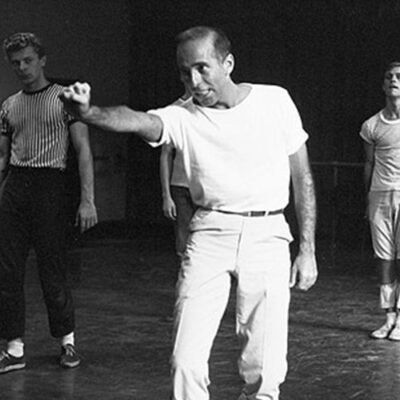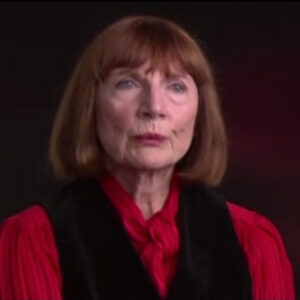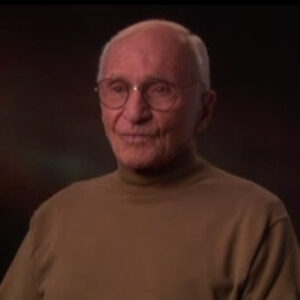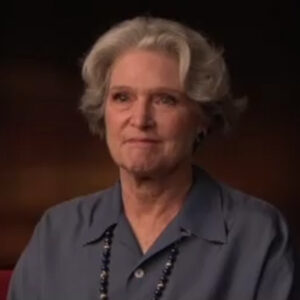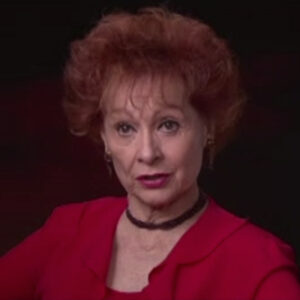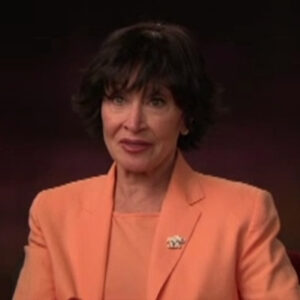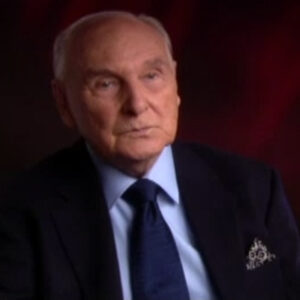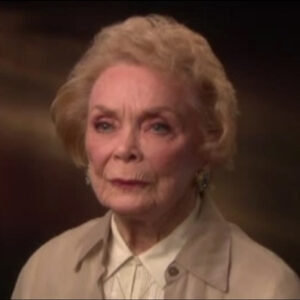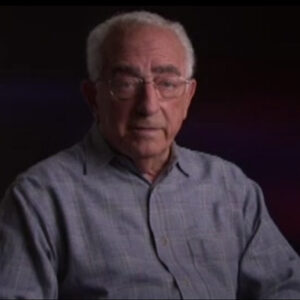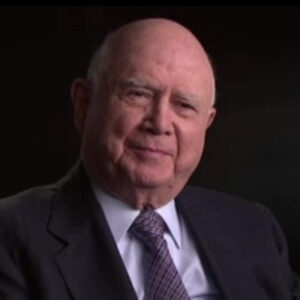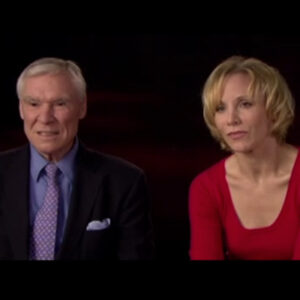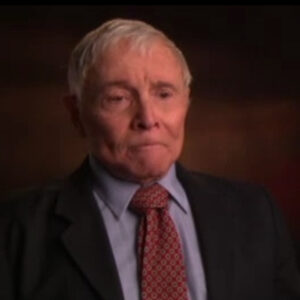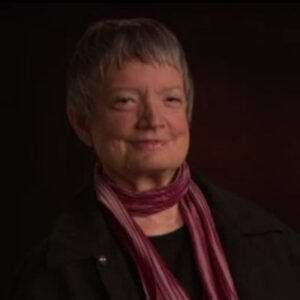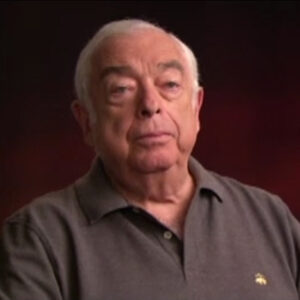Speaker Today, when people think of New York City Ballet, they think of Lincoln Center and big audience houses and such, but it wasn’t always that way. I wonder if you could give us a picture of what it was like when you joined the New York City Ballet?
Speaker Well, we were just beginning. And so it was with Balanchine’s help, which we formed a company. And it was interesting because Jerry was speaking about. Didn’t have a very much of a classical training, and Balanchine was. She wanted very much for Jerry because he liked him very much to learn classical ballet. So he did it, this piece called Mozart. It was a Mozart and Jerry worked with a feather in it, I remember, and his mother and father came backstage and they laughed. They couldn’t believe that was their son because he was not a classical dancer. He was a Broadway dancer. But, well, friends, we did, prodigal son. And it was wonderful because he was down on his knees and I was put on the siren with a cape that was much too heavy for me. So I. You know, at one point we’re supposed to sit on his head and he’s down there waiting and he’s sitting on my head, sit on my head. It was very funny. Anyway, he was very good and prodigal son.
Speaker What was it like in the early years of the company and for example, how often did you dance and what were they?
Speaker I danced.
Speaker I danced every performance, but the company did not dance every every night of the week. Right now, they know they dance every year.
Speaker Yeah, but what was it like there? Well, we danced when we could and Willink and Kirstine could get the money together. We were very poor, but we had Balanchine.
Speaker What was it about Jerry that made Mr. Balanchine want to ask him to join, particularly given the fact that he wasn’t a ballet dancer?
Speaker Well, Jerry had a great talent. He was very musical, for one thing, and he was extremely talented. So it took a real interest in.
Speaker Do you suppose that what was it about his talent, I mean, the fact that he didn’t duplicate balance sheets in some way must have made it more interesting for him in terms of balancing wanting to build an audience. What was it about that?
Speaker Well, it was good to have Jerry in our company because we had a Broadway type with us then sort so in the audience. Not everyone liked classical ballet and they liked musical comedy and Jerry was able to provide that to them.
Speaker And how did the other people in the company feel about Jerry when you joined?
Speaker Oh, I think they liked him. Everybody liked Jerry. You couldn’t not like Jerry because he had a wonderful sense of humor and he always found something to laugh about. And I think that’s very important to be able to laugh.
Speaker How did he feel about Balanchine?
Speaker Well, he admired and that’s why he came. He admired what he was doing and what he was creating.
Speaker Let’s talk a little bit about the guests, because, of course, there’s no record of the guests. So tell me about it. What was it about?
Speaker Well, it was about people, some of them not recognizing the other ones. And that was it was very simple. It wasn’t a very good ballet, to tell you the truth.
Speaker But the obviously didn’t last, so there’s no reason for that.
Speaker Yeah, but the theme was kind of interesting, I think, because it was sort of a precursor to another work that Jerry did later on. Right. Some people said that it was a had a sort of Romeo and Juliet kind of. What can you tell us about that?
Speaker I really can’t tell much about it. I don’t know much about that.
Speaker I don’t know how Jerry’s rehearsals different than balance sheets.
Speaker Well, they were any different.
Speaker Jerry, you know, had a wonderful sense of humor, for one thing. So, you know that. And I loved working with him and I loved dancing with him.
Speaker Did you find when he made pieces on you that he was more or less than Balanchine making it particularly tailored for you?
Speaker Well, both of them did that.
Speaker OK, temperamentally, how did they come here?
Speaker Well, as I said, Jerry had had a broad where he was a Broadway boy, that’s what he was. Balanchine was Russian. He was from the old school, from the Mariinsky School. And he took a great interest in Jerry and wanted him to learn classical ballet. And that’s why he did the ballet motile so that Jerry could learn. And he kind of laughed at himself because he thought it was very funny what he was doing.
Speaker How what was it about?
Speaker We ask you this a different way. Somebody somebody other than Balanchine who wanted to teach Jerry about classical dancing might have gone about it quite differently.
Speaker Balanchine apparently did it. By showing through a ballot is what was it about the Demento and how he worked with Jerry that enabled him to further his technique?
Speaker Well, he was trying to teach Jerry classical ballet because he had not had a classical ballet background. And so Balanchine wanted Jerry to learn this, and he did.
Speaker Sort of filling in a gap in his education. We’re talking about Karakol. Mm hmm.
Speaker OK.
Speaker You wrote in your autobiography that and then we’ll get off the gas. I just want to ask you one more question. You wrote in your autobiography, the guess was, I’m quoting you clearly the work of a young master destined for greatness. What about the valley made you feel that at the time?
Speaker Well, just the way it was done, it was, you know, something that was having starting to incorporate classical ballet.
Speaker OK, do you remember what Balanchine said about the ballet? No, he said it was about the colluded.
Speaker Remember that included in the act? Yeah, yeah, yeah. Now a number of times Felching asked Jerry to actually choreograph with him, beginning with Jones Beach. Yeah. Why do you suppose he did that? And what was that like?
Speaker Well, because he likes Jerry very much and he wanted to teach him classical ballet. So that’s what happened.
Speaker How do they work together when they were choreographing?
Speaker Well, they were together very well and they respected each other.
Speaker Did they work in the same room or did they divide up the pieces or. No, I think they divided up. You wrote also about Verafin task and you wrote about Jerry and Tinnie and their movement. Yeah, I wonder if you could tell me about them. How were they dancing together?
Speaker Well, they were wonderful because Tania was very tall and Jerry was not that tall. So she was very piquant. And Jerry was had, as I said, the sense of humor. So they were able to do it.
Speaker What did you observe about their relationship? They were friends, they were good friends.
Speaker What do you suppose it was in Jerry that made Balanchine want to revive product? What were the qualities in Jerry that came out in that performance?
Speaker Well, his musicality, he was extremely musical. So that was what was very good.
Speaker But he could have been musicality would be it would be a help in any bill.
Speaker But what particularly was it about Prodigal that made Balanchine want to revive that for Jerry?
Speaker Well, I don’t know, Jerry. It was a good actor and you had to be a good actor to play that role.
Speaker Oh, what did Jerry tell you about his feelings about the role? He didn’t say anything. OK, what was he like as a partner? He was a good partner. How so?
Speaker Well, he just was he was you know, he was very caring. He like me and I liked him, so.
Speaker Did Balanchine ever talk to you about his reaction or non reaction to Jerry’s testifying before the U.N. committee?
Speaker No, you wrote in your book that Jerry did something that was very sweet after you separated from Mr. Balanchine and it had to do with a preview performance of The King and I.
Speaker Do you remember that he arranged for me to go there with Lenny Bernstein. He in fact, it was a date. I mean, who dated Lenny Bernstein? He was the most famous conductor in the world. And we went and during the whole performance, he kept humming tune, saying it was from this from that he ruined the evening for me completely. So I guess that didn’t work out. No, no, my my my blind date was too blind.
Speaker OK.
Speaker You told a story? Well, actually, I wonder if you can just you started to tell me before and I wonder if you can just repeat it. You witnessed Jerry’s mother, particularly, I think, coming backstage after Karakol.
Speaker We’re all laughing. And Jerry in his in his ballet outfit because she wasn’t used to seeing her son like that.
Speaker What did you get from her attitude, was she. I didn’t talk to her.
Speaker Um, you were the reigning ballerina when Nora joined the coma and she was also noted by that time, Menora noted, for she was a dramatic actress, not a very good classical dancer, but she was a dramatic actress. And Jerry made a ballet for her that was rather commercial. Could you tell me about that?
Speaker What was it called? I can’t remember the cage that’s right now. Well, she was a spider. She was a praying mantis. So that was especially just for Nora’s talent. She was a dramatic dancer. And what was your response to that? It was all right. I didn’t want to dance that somebody wanted me to dance. And I said no. Was it shocking for its time? Well, it was just, you know, she was a bug who wants to be a bug.
Speaker Um, what can you tell us about her relationship with Jerry?
Speaker They were good friends, they joked.
Speaker Over the years, how did Balanchine treat charity in the company?
Speaker Oh, he liked them because he wanted you know, Jerry was always joking about everything, making jokes, and Balanchine liked him.
Speaker How about how did they work together in the sense that Jerry I mean, Balanchine was the boss, so Jerry have to get approval from him for.
Speaker I’m just trying to figure out how they work together in running the New York City Ballet at that time.
Speaker Well, it was we were being a little bit of Broadway into the classical ballet.
Speaker Did Balanchine have did Jerry have to get approval from him to do things?
Speaker No. No, he did. Balanchine respected him.
Speaker How would you say that Gerry’s choreography was distinctive, even though he was working in the show?
Speaker With more Broadway like.
Speaker Well, take something like, for example, dances at a gathering, you wouldn’t call that more Broadway.
Speaker I know. Well, and yet it was very different from now. Yeah, it was how well, it was just different more.
Speaker You know, it wasn’t the classical Maryanski School that we all knew.
Speaker How would you describe Nigeria’s contribution to American Ballet?
Speaker Well, I think he played a great part because he he brought another element to classical ballet, which was very good. We weren’t just a classical company then with Jerry there. We were little we could be a little Broadway.

